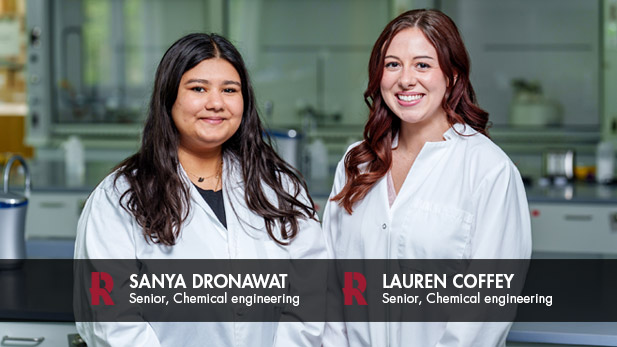Chemical Engineering Students’ Research Helps Bring Promising Shingles Breakthrough

An innovative project for the FetTech biotech startup inspired Sanya Dronawat (left) and Lauren Coffey to have additional industry internship and college research experiences and, eventually, future career opportunities.
Chemical engineering students Lauren Coffey and Sanya Dronawat were presented with a unique research opportunity as early as their sophomore year – to work on a project that’s contributed to the development of technology showing promise in preventing the painful rash caused by shingles from spreading in human skin.
They spent several weeks in 2022 conducting solubility tests and experiments on FetTech's Multi-Tissue Platform (MTP) technology, which was originally developed as a regenerative therapy for wounds and burns. The students honed their problem-solving abilities by designing their own experiments and procedures under the guidance of chemical engineering professors Heather Chenette, PhD, and Irene Reizman, PhD. Their tests helped FetTech, a Florida-based biotech startup founded by 1999 chemical engineering alum Clay Fette, better understand how to develop a topical gel version of the MTP powder to treat skin conditions.
Recent testing sponsored by the National Institutes of Health has now found the MTP gel and powder to be "highly effective" at halting the spread of the Varicella zoster virus that causes shingles in ex vivo human skin samples even when applied several days after infection occurs. Shingles impacts 1 million Americans each year.
“I am grateful for the opportunity to be a part of a solution for a real-world problem,” said Coffey, who has had family members affected by shingles. “Hearing the successful results from the human skin study not only makes me proud of the work that I was able to contribute to the project, but also motivates me to continue to make positive impacts in my community using chemical engineering.”
Coffey added that working with Fette and other company researchers as a sophomore was an invaluable learning experience that helped grow her problem-solving abilities. "It was obvious that [Fette] truly cared about developing our abilities as future chemical engineers, and his inquisitive mindset was admirable and a characteristic that I have made efforts to adopt," she remarked.
The project provided other research opportunities for Coffey, now a senior, during her Rose-Hulman career, including an independent biochemical engineering study on micro-aerobic fermentation conditions that aided her internship at Eli Lilly & Company. She is now working on an engineering management project that’s applying Six Sigma methodology to improve operations for a non-profit organization in Terre Haute, Indiana. She will present aspects of her report at an international conference in May. Coffey is also working with chemical engineering professors Atanas Serbezov, PhD, and Gregory Neumann, PhD, to help transition software for the department’s Unit Operations Laboratory, priming her for a Senior Engineer position with Lilly that she will assume after graduation.
Similarly, Dronawat integrated knowledge from her double majors in biochemistry and chemical engineering during the FetTech project. Conducting literature reviews and experimental designs taught her new research skills that benefited her subsequent work as an undergraduate researcher at Northwestern University’s Center for Food Allergy & Asthma. Dronawat aspires to continue advancing public health through graduate research.
"It's encouraging to know that the work that Lauren and I did in the lab has the potential to have far-reaching impacts on antiviral treatments and positively affect those with afflictions like shingles," said Dronawat, also now a senior. “I appreciate the opportunity to witness a different side of research, where we were given substantial decision-making responsibilities, fostering a sense of confidence and providing a rich learning experience.”
Fette, who has pioneered regenerative medicine technologies for over 20 years, knew the unique extracellular matrix composition of the Multi-Tissue Platform warranted specialized chemical engineering expertise. That’s why he turned to his alma mater, which he considers having the best chemical engineering program in the country. (The institute has earned national recognition for undergraduate engineering education from several sources, including college guides published by the Wall Street Journal, U.S. News & World Report, and Princeton Review.)
Department of Chemical Engineering Head and Professor Kimberly Henthorn, PhD, one of Fette's former classmates, connected him with Chenette, Reizman and the student researchers. Fette provided solubility testing parameters and gel prototypes for Coffey and Dronawat to experiment on during weekly lab sessions.
“Undergraduate research is absolutely key, especially for those students who think they might want to go into a field where they have to use their creativity,” said Henthorn.
Fette, who also earned a chemical engineering master’s degree from Rose-Hulman in 2004, added that this particular research project “was a win-win for both of us. FetTech received some much needed chemical engineering input which was directly used in the development of the gel product while the students at Rose were exposed to real world industry applications and projects."
With the new antiviral findings, Fette sees even more possibilities within the Department of Chemical Engineering and the institute’s Rose-Hulman Ventures product research and development firm to involve students in projects related to gel technology and tube form materials, along with possibly the design of a meniscus implant. The promising shingles treatment demonstrates how the problem-solving skills honed by the institute's project-based curriculum can lead to health care innovations that benefit millions.
Coffey and other students discuss their experiences in undergraduate research projects on campus at: https://www.youtube.com/watch?v=pElWqkxiCXc